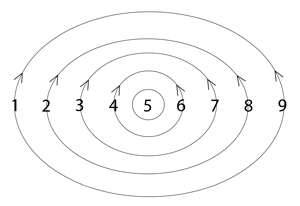govern reality
6-3-9
Conventional Understanding
Most people understand governing reality as controlling external circumstances through willpower, discipline, or authority. This approach positions us as separate from our experience, attempting to bend reality to our expectations through effort and determination. Society reinforces this perspective through self-help philosophies of manifestation, productivity systems, and achievement-focused thinking that treat reality as something to be conquered or mastered. This fragmented understanding leads to cycles of striving and disappointment as we try to force outcomes rather than participate in what’s unfolding.
Resonant Understanding
Mathematical analysis of language reveals “govern reality” carrying a 6-3-9 resonance pattern, sharing this numeric signature with expressions like “integrates information,” “alchemist,” and “life is art.” This pattern represents “love” (govern, 2-7-9) applied to the “visible experience of mind” (reality, 4-5-9). Rather than controlling circumstances, governing reality involves conscious participation in the unfolding process through present awareness. Like an alchemist who doesn’t force transformation but creates conditions for natural transmutation, we participate in reality’s unfolding by being fully present with what is, allowing integration to happen naturally rather than through forced control.
Expressions Spectrum Analysis
In balanced expression, this resonance pattern appears as “alchemist,” “being my awareness,” “care,” and “life is art,” revealing how governing reality naturally functions as conscious participation rather than control. When we embody these expressions, we experience life as a creative process we’re intimately involved in rather than a set of circumstances to manage. There’s a quality of presence and attention that allows for natural integration and transformation without forcing outcomes. Like a gardener who works with natural cycles rather than against them, we participate in reality’s unfolding by attending to what wants to emerge rather than imposing our will.
When over-modulated, expressions include “control system,” “forcing,” “becoming an identity,” and “tyranny,” demonstrating how natural participation becomes distorted into dominance and manipulation. These aggressive expressions attempt to impose predetermined outcomes rather than allowing natural unfolding. In daily life, this manifests as rigidity, stress, and resistance to what is actually happening. The more we try to control reality, the more we experience separation and struggle, creating the very resistance we’re trying to overcome.
Under-modulated expressions such as “denial,” “despair,” “living in fear,” and “withhold” show what happens when we withdraw from active participation in our experience. These passive patterns reveal disconnection from the creative process, leaving us feeling powerless and separate from life’s unfolding. Like someone watching life pass by without engaging, under-modulated governance creates a sense of victimhood where we feel things happen to us rather than with our participation.
Russell’s Cosmogony Connection
The mathematical structure underlying language shows “govern reality” (6-3-9) as an integrative function within the creative process, which aligns with Russell’s understanding of how consciousness participates in creation.
In “The Universal One,” Russell writes: “All things can be what they desire to be. Desire and effort to be evolves into the reality of that desire.” This principle illuminates how “govern reality” functions as integration rather than control. The balanced expression “alchemist” reveals how governance involves participation in transformation rather than forcing it. Just as the alchemist provides conditions for natural transmutation without imposing an artificial process, governing reality involves conscious participation in the unfolding of desire into form through present awareness.
The quote shows how reality isn’t something separate to be controlled but the natural evolution of desire through effort, precisely what we see in the balanced expressions like “integrates information” and “life is art.” When we approach reality as artists or alchemists rather than controllers, we align with this natural unfolding process where desire evolves into form. This stands in contrast to both the over-modulated expressions like “control system” and “forcing” that attempt to impose desire, and the under-modulated expressions like “denial” and “despair” that withdraw from active participation in the process.
Practical Implications
Understanding “govern reality” as conscious participation rather than control transforms our approach to life. Instead of struggling against circumstances, we recognize our role as participants in a creative process that unfolds through our awareness and attention.
This understanding invites practices that foster balanced governance:
- Being practices that develop our capacity to be with what is without immediately trying to change or control it
- Awareness that notices patterns and relationships without imposing judgments or expectations
- Creative response that works with what’s emerging rather than forcing predetermined outcomes
- Boundary awareness that recognizes natural limitations as defining features that give form to experience rather than obstacles to overcome
This analysis of “govern reality” enriches the understanding of generative participation. Rather than focusing only on how we initiate creative processes, it reveals how we participate throughout the entire unfolding through our quality of attention and presence. This transforms manifestation from a struggle to make things happen into a dance of participation with what’s already unfolding.
In practical terms, this means shifting from asking “How can I make reality conform to my desires?” to “How can I participate more consciously in what’s unfolding?” This subtle but profound shift aligns us with the natural creative process rather than positioning us against it, allowing for more harmonious and effective engagement with life.


